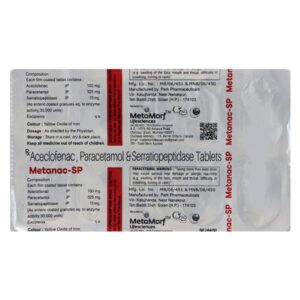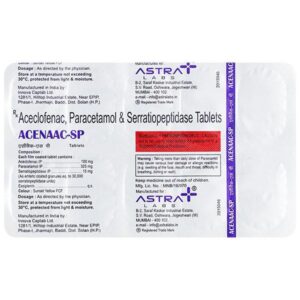ACECLOFENAC + PARACETAMOL + SERRATIOPEPTIDASE TAB
Aceclofenac: Aceclofenac is a nonsteroidal anti-inflammatory drug (NSAID) that is used primarily to treat pain and inflammation associated with conditions like osteoarthritis, rheumatoid arthritis, ankylosing spondylitis, and other musculoskeletal disorders.
The mechanism of action of aceclofenac is similar to other NSAIDs. It works by inhibiting the production of prostaglandins, which are responsible for pain, inflammation, and fever. By blocking the activity of an enzyme called cyclooxygenase (COX), which is involved in the synthesis of prostaglandins, aceclofenac helps to relieve pain and reduce inflammation.
The usual recommended dose of aceclofenac is 100 mg to 200 mg per day, divided into two or three doses. It is usually taken with food to minimize stomach upset. The dosage may vary depending on the condition being treated and the individual patient’s response to the drug. It is important to follow the instructions provided by the healthcare professional or stated on the medication label.
As with any medication, aceclofenac may cause side effects. Common side effects include indigestion, stomach pain, nausea, diarrhea, headache, dizziness, and skin rashes. Less common but more serious side effects may include gastrointestinal bleeding, ulceration, liver problems, and allergic reactions. If any severe or persistent side effects occur, it is important to seek medical attention promptly.
Aceclofenac should be used with caution in individuals with a history of stomach ulcers, liver or kidney disease, and those who are allergic to other NSAIDs. It is not recommended for use in pregnant women, as it may harm the developing fetus. Aceclofenac may also interact with certain medications, so it is essential to inform the healthcare provider of all other medications being taken.
It is crucial to use aceclofenac as prescribed by the healthcare professional and not exceed the recommended dose or duration of treatment. If symptoms worsen or do not improve after a few days of taking the medication, it is advised to consult a healthcare professional for further evaluation and advice.
Paracetamol: Paracetamol, also known as acetaminophen, is a widely used over-the-counter medication and a common analgesic (pain reliever) and antipyretic (fever reducer). It is commonly used to alleviate mild to moderate pain and reduce fever.
The exact mechanism of action of paracetamol is not fully understood. It is believed to work by inhibiting the synthesis of prostaglandins in the central nervous system, which are responsible for transmitting pain signals and triggering fever. By doing so, paracetamol helps to reduce pain and fever, but it has limited anti-inflammatory effects compared to other nonsteroidal anti-inflammatory drugs (NSAIDs).
Typically, the recommended dose of paracetamol for adults is 325-1000 milligrams (mg) every 4-6 hours, with a maximum daily dose of 4 grams (4000 mg). For children, the dosage is weight-based, and it is important to follow the instructions on the package or consult a healthcare professional for accurate dosing instructions.
While generally considered safe when taken at recommended doses, paracetamol may cause some side effects. Common side effects include nausea, vomiting, and stomach upset. In rare cases, it can cause serious liver damage if taken in excessive amounts or in combination with alcohol. It is important to not exceed the recommended dose and to avoid consuming alcohol while taking paracetamol.
Additionally, some individuals may be allergic to paracetamol and experience allergic reactions such as skin rash, itching, or swelling. If any adverse reactions occur, it is important to discontinue use and seek medical attention.
It is worth noting that paracetamol is present in many combination medications, such as cough and cold remedies, so it is essential to be mindful of total paracetamol intake from all sources to avoid exceeding the recommended dose and risking potential toxicity.
Serratiopeptidase Tab: Serratiopeptidase, also known as Serratia peptidase or serrapeptase, is an enzyme that is commonly used in medication form as Serratiopeptidase tablets. It is primarily used to reduce inflammation and promote tissue healing.
Serratiopeptidase works by breaking down certain proteins in the body that are involved in the inflammation process. This helps to relieve swelling, pain, and other symptoms associated with various conditions such as arthritis, sinusitis, and trauma.
The usual recommended dose of Serratiopeptidase tablets is 10-30mg per day, but the exact dosage may vary depending on the condition being targeted and the individual patient’s response. It is typically taken orally, with or without food, preferably on an empty stomach. The duration of treatment may also vary, ranging from a few days to several weeks, depending on the specific condition and its severity.
As with any medication, there can be side effects associated with the use of Serratiopeptidase. Common side effects may include mild gastrointestinal symptoms such as stomach pain, nausea, and diarrhea. Rarely, allergic reactions, skin rashes, or headaches may occur. If any severe or persistent side effects occur, it is important to seek medical attention promptly.
It is important to note that Serratiopeptidase tablets should not be used without proper medical supervision. It is always advisable to consult with a healthcare professional before starting any new medication, to ensure it is appropriate for your specific condition and to discuss potential risks and benefits.


